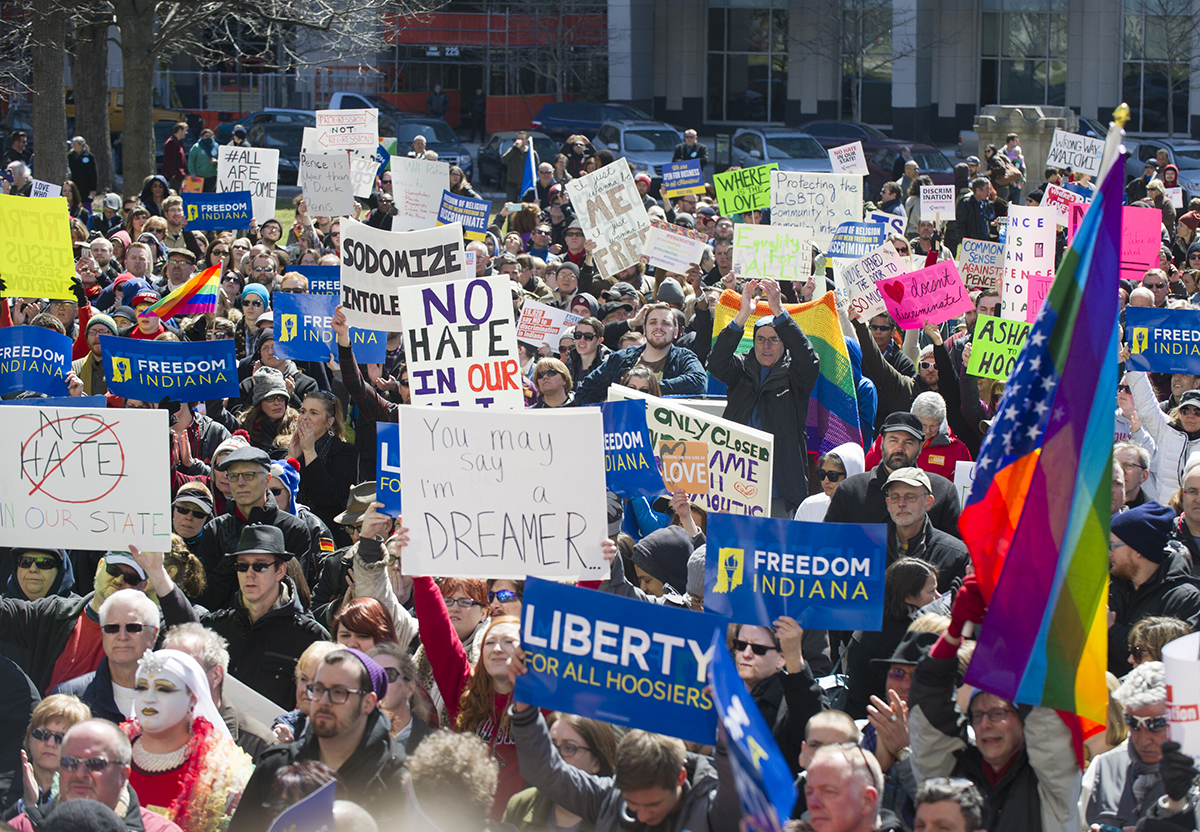Ga. Mulls Religious Exemption As Ind. Tackles ‘RFRA Crisis’

Doug McSchooler / Associated Press
“The RFRA Crisis,” is how Chris Gahl, with the Indianapolis tourism agency Visit Indy, refers to the months after that state passed its Religious Freedom Restoration Act.
Supporters of the religious exemption bill downplay the potential business impact in Georgia, but Indiana has been living through a similar bill’s aftermath for a year.
Gahl’s office believes at least 12 conventions have pulled out of the state since then.
“It’s run the gamut of medical to life science, from pharmaceutical to sports, from education to faith based groups,” Gahl said. “It’s really a broad swath of groups that have said no to Indianapolis.”
The chamber’s conservative estimate puts that at $60 million in lost business directly tied to “religious freedom.”
“Those are facts; that is the impact we have seen and been able to tally,” said Gahl, adding that there’s no way to know how many groups have given Indiana “the silent treatment” by avoiding the state without expressing why.
He said, as recently as January, a major group told his office explicitly, “we can’t sell Indianapolis to our attendees,” and canceled their event. Gahl said companies have pointed to the toxicity of the perceptions of discrimination in the state.
In Georgia, Disney and Marvel are the latest to signal unwillingness to do business in the state if the Free Exercise Protection Act becomes law.
“Disney and Marvel are inclusive companies, and although we have had great experiences filming in Georgia, we will plan to take our business elsewhere should any legislation allowing discriminatory practices be signed into state law,” said a spokesperson in an emailed statement.
Atlanta’s Convention and Visitors Bureau has confirmed 15 clients expressing concerns about their attendees and sponsorship if the bill passes, and the NFL has referred to its policy of prohibiting discrimination when asked about Atlanta’s bid to host a future Super Bowl.
Georgia Sen. Greg Kirk continues to defend the bill he co-authored, and has said he doesn’t believe the state’s economy will take a hit.
“Georgia’s the number one place to do business,” Kirk said. “That has not changed, and this bill does not change that one bit.”
Indiana, Gahl said, is still “clawing” its way back out of the PR disaster. He said protecting tourism jobs and attracting businesses has been abnormally difficult.
“You have natural crises and you have manmade crises and you have tourism crises,” said Gahl, whose office continues to monitor and research the impact their law has had on perceptions of his state.
“Seven months after our crisis, it wasn’t the fact that we hosted the men’s Final Four or the world’s largest single day sporting event, the Indy 500, it was still this very polarizing issue that was coming top of mind,” he said.
Like Atlanta’s “Welcoming City” initiative, Indianapolis has “Hoosier Hospitality,” their core branding platform. Gahl said it’s been tough sell lately.
Correction: An earlier version of this story stated that Chris Gahl was with the Indiana Chamber of Commerce. He is actually vice president of marketing and communications for Visit Indy, which is a tourism agency for the city of Indianapolis, not the state of Indiana.
9(MDAxODM0MDY4MDEyMTY4NDA3MzI3YjkzMw004))








